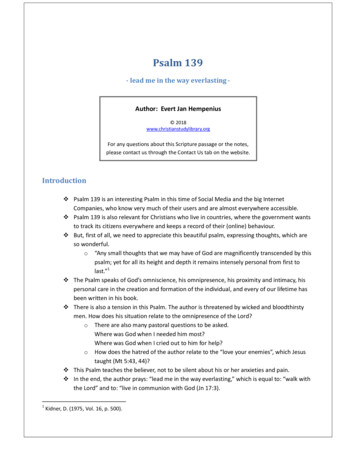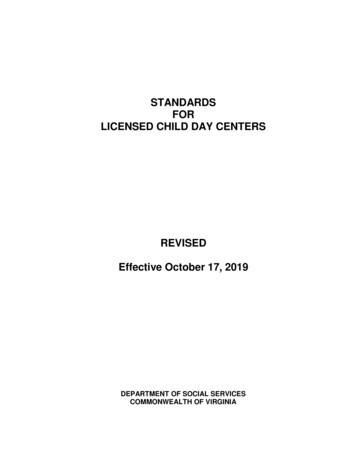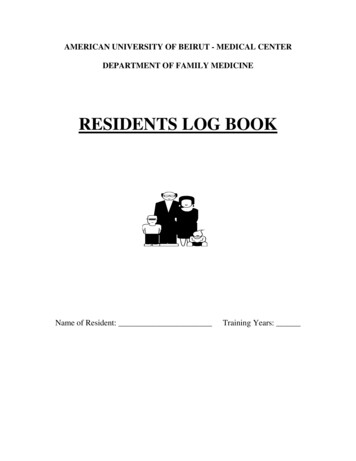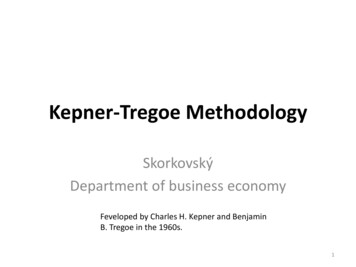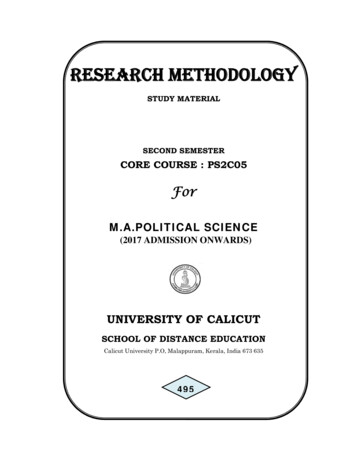
Transcription
RESEARCH METHODOLOGYSTUDY MATERIALSECOND SEMESTERCORE COURSE : PS2C05ForM.A.POLITICAL SCIENCE(2017 ADMISSION ONWARDS)UNIVERSITY OF CALICUTSCHOOL OF DISTANCE EDUCATIONCalicut University P.O, Malappuram, Kerala, India 673 635495
School of Distance EducationUNIVERSITY OF CALICUTSCHOOL OF DISTANCE EDUCATIONSTUDY MATERIALSECOND SEMESTERMA POLITICAL SCIENCE(2017 ADMISSION ONWARDS)CORE COURSE :PS2C05 : RESEARCH METHODOLOGYPrepared by :Sri. P. K. VargheseAssociate. Professor and HeadPG Department of Political ScienceST. Mary’s College,Sulthan BatheryLayout: ‘H’ Section, SDE ReservedResearch MethodologyPage 2
School of Distance EducationCONTENTSPAGE NO.MODULE IRESEARCH METHODOLOGY05 – 16MODULE IITYPES OF RESEARCH17 – 23MODULE IIISAMPLING24 – 28MODULE IVDATA COLLECTION29 – 43MODULE VPROBLEM FORMULATION44 – 48MODULE VIRESEARCH REPORT49 – 58REFERENCESResearch Methodology59Page 3
School of Distance EducationResearch MethodologyPage 4
School of Distance EducationMODULE IRESEARCH METHODOLOGYNature & Meaning of ResearchIn the modern complex world every society today is faced with serious social, economic &political problems. These problems need systematic, intelligent and Practical solutions. Problemsolving is technical process. It requires the accumulation of new knowledge. Research provides themeans for accumulating knowledge & wisdom. In other words, research is a systematic effort ofgathering analysis & interpretation of problems confronted by humanity. It is a thinking process andscientific method of studying a problem and finding solution. It is an in-depth analysis based onreflective thinking.DefinitionsResearch in common parlance refers to a search for knowledge. One can also defineresearch as a scientific and systematic search for pertinent information on a specific topic. Researchis an academic activity and the term should be used in a technical sense.a) -William Emory defines Research as "any organised enquiry designed and carried out toprovide information for solving a problem"b) The new Oxford English Dictionary defines research is "the scientific investigation into andstudy of material, sources etc in order to establish facts and the reach new conclusions".c) Redman and Mory defines, research as "a systematised effort to gain new knowledge''.d) "A careful investigation or inquiry specially through search for new facts in any branch ofknowledge" Advanced Leaner's Dictionary.Characteristics of ResearchThe above definitions reveal the following characteristics of Research1. Research is a systematic and critical investigation into a phenomenon.2. It is not mere compilation of facts.3. It adopts scientific method.4. It is objective & Logical5. It is based on empirical evidence.& solutions to problems.6. Research is directed towards finding answers to questions7. It emphasis the generalisation of theories and principles.Objectives of ResearchThe objectives of Research can be grouped under the following heads1. To gain familiarity with a phenomenon or to achieve new insights to it.Research MethodologyPage 5
School of Distance Education2. To portray accurately the characteristics of a particular individual situation or a group.3. To determine the frequency with which something occurs or with which it is associated withsomething else.4. To test a hypothesis or a casual relationship between variables.Motivations in ResearchWhat makes people to undertake research?The answer is as follows.1. Desire to get a research degree along with its benefits.2. Desire to face the challenge in the solving the unsolved Problem.3. Desire to get intellectual joy of doing some creative work.4. Desire to be of service to Society.5. Desire to get respectability.Importance of Research"All progress is born of enquiry. Doubt is often better than overconfidence, for it leads toenquiry & enquiry leads to investigation". Research has an important role in guiding social plan.Knowledge of the society & the cultural behaviour of the people require proper planning for theirwell development. Because knowledge & cultural behaviour of human being are interdependent. Areliable knowledge is needed for planning & this is possible only through research.Knowledge is a kind of power with which one can face the implication of a particularPhenomenon.Research provides the basis for all govt policies in our economic system.Research help us in making predictions. Eg. Chernobil Nuclear, nuclear plant disastrour,Bhopal gas disastrour.Research is equally important in seeking answer to various social problems In addition tothis, the significance of research can be understood with the following points.1. To the students who are to write a PHD; it is a careerism.2. To Professionals in research methodology, research means a source of live hood.3. To Philosophers & thinkers research may mean the outlet for new ideas and insights.4. To literary man research means the development of new styles & creative work.5. To the intellectuals research mean the generalisation of new theories.Research MethodologyPage 6
School of Distance EducationResearch Method & Research MethodologyIt is necessary to explain the differences between research methods & researchmethodology. Research methods may be understood as all those methods & techniques that areused for conducting research. Research methods, thus refer to the methods the researcher use inperforming the research operations. In other words all those methods which are used by theresearcher during the course of his research problem are termed as as research methods.Research methodology is a way to systematically solve the research problem. It may beunderstood as a science of studying how research is done scientifically. Abraham Kaplan definesresearch methodology in this way. Research methodology is "the description, explanation &Justification of various methods of conducting research".Research Methodology has many dimensions and research methods do constitute a part ofResearch Methodology. The scope of Research Methodology is wider than that of researchmethods. "Thus, when we talk of research methodology we not only talk of the research methodsbut also considered the logic behind the methods we use in the context of our particular method ortechnique & why we are not using others. So that research results are capable of being evaluatedeither by the researcher himself or by others" Why a research study has been undertaken how theresearch problem has been defined in what way & why the hypothesis has been formulated, whatdata have been adopted etc ate usually answered when we talk of Research Methodology.Scientific MethodResearch is a scientific endeavor"The Scientific Method is a systematic step-by-step procedure following the logical processof reasoning". (Clover Vernon.T) Scientific Method is a means for gaining knowledge of theuniverse. It is an objective logical & Systematic Method of analysis of a phenomenon, devisepermit the accumulation of reliable knowledge. It is a systematized form of analysis. It ischaracterized by intellectual attitude. The Scientific Method is based on certain articles of faith theyare;a) Reliance on evidenceTruth is established on the basis of evident conclusion is admitted only when it is based onevidenence. The answer to a question is not decided by imagination or guessb) Commitment to ObjectivityObjectivity is the hall mark of Scientific method. Objectivity is the willingness & ability toaccept truth with our bias.c) Ethical NeutralityScience does not pass normal judgment on facts. It does not say that they are good or bad.Science never imposes anything. Science aims at nothing but making true & adequatestatements about the object.Research MethodologyPage 7
School of Distance Educationd) VerifiabilityThe conclusions arrived by a scientist should be verifiable. He must make known to othershow he reached at his conclusion. Such verifications help in further research.f) Logical Reasoning ProcessThe Scientific Method involves the logicalprocess is used for drawing inference from theconclusion.e) s of reasoning. The reasoningprocesss of a study or for arriving at afindingaThe Research ProcessSelection & Formulation of a problemAnalysis & Interpretation of DateFormulation hypothesisGeneralisationFormulation Research designCollection of dataThe Research Process is the Paradigm of research project. In a research project there arevarious scientific activities. The research process is a system of Interrelated activities. Usuallyresearch begins with the selection of a problem. The various stages in the research process areexplained in the above diagram. Research is a cyclical process. If the Data do not support thehypothesis, research is repeated again.C.R. Kothari in his book, "Research Methodology: Methods & Techniques" presents a briefoverview of a research process. He has given the following order concerning the Research Process.1. Formulation the Research problem2. Extensive Literature survey3. Developing the hypothesis4. Preparing the research design5. Determining sample design6. Collection of Data7. Execution of the ProjectResearch MethodologyPage 8
School of Distance Education8. Analysis of Data9. Hypothesis testing10. Generalisation & Interpretation11. Preparation of the report.Qualities of Good Research WorkerThe success of any Research to a great extent depends on the qualities of the Researcher.The qualities are two fold.1.1.General Qualities2.Specific QualitiesGeneral Qualitiesa) Scientific attitudeThe 1st essential quality of a successful research worker is that be must possess a scientificframe of mind. Human beings have certain prejudices but a researcher should not be guided by this.He must develop a spirit of science in his mind.b) Imagination & insightThe researcher must possess a high degree of imagination. He should be able to go deeper &deeper into the area of social phenomena & visualise the intangible aspects of society.c) PerseveranceThe work of scientific Research requires unlimited patience. He should not get easilydiscouraged. He may often face serious difficulties. But he must develop courage to face, thedifficulties & work patiently.d) Quick Grasping PowerThe Researcher should possess the power to grasp the significance of things quickly.e) Clarity of thinkingA good Researcher should have clear idea about terminology that he is going to use.2. Specific Qualitiesa) Knowledge of the SubjectThe researcher should be an expert in the study of the subject which he is going to research.Hence he should read all texts on the matter & form of clear-cut idea bout the subject under study.b) Knowledge of the Research TechniqueResearch MethodologyPage 9
School of Distance EducationThe Research worker should also possess an ultimated knowledge of the techniques heapplies in solving the problem.c) Personal TasteA Personal taste in the study will inspire him & keep his morale high in times of difficulties.d) Unbiased AttitudeThe Researcher should have no pre conception about the subject under study. He shouldmaintain an open mind.Factors Which Hinder Research1. Tradition in the community is a powerful retarding influence2. Lack of time, energy & resources.3. Research is considered to the business of a few armchair academicians.Problems faced by Researchers in IndiaResearchers in India particularly those engaged in research in Social Science face the followingproblems.1. The lack of scientific training in the methodology of research.2. There is insufficient interaction between the University Research Department and businessestablishments & govt. departments.3. In the fear of misuse govt. is not willing to supply basic documents.4. There does not exist a code of conduct for researchers.5. Another difficulty is insufficient secretarial assistance6. Library management is not satisfactory in many places.7. Lack of time and moneySocial Science ResearchSciences are broadly divided into physical sciences & social sciences. Social sciencesinclude various disciplines dealing with human nature, human life, human behaviour, social groups& Social institutions. Example Artropology, Commerce, Economics, Geography, History, Law,Political science, Phychology, Sociology etc. All these branches are separate but areinterdependent.Social Science Research is a systematic method of exploring analysing & conceptualizinghuman life in order to extent, correct or verify the knowledge of human behaviour & social life.Research MethodologyPage 10
School of Distance EducationSocial Research, "Seeks to find explanations to unexplained social phenomena, to clarify thedoubtful & correct the misconceived facts social life"- Pauline. V. Young.Objectives of Social Science Researcha) The aim of Social Science Research is to discover new facts or verify and test old facts.b) It tris to understand the human behaviour & its interaction with the environment & Socialinstitutions.c) It tris to find out causal connection between human activities and natural laws governingthemd) Another purpose of Social Science Research is to develop new tools and techniques in socialscience.Functions of Social Science Research1. Discovery of facts & their interpretations - Research provides answer to questions of what,where, when & how of man, social life and institutions. There are half truths pseudotruthsand superstitions. Discovery of facts enlights us.2. Diagnosis of problems- The developing countries face so many problems such as povertyunemployment, Social tensions, law productivity etc. Social Science Research helps todiscover solution to this problems.3. Systematization of knowledge- The facts discovered through research are past & parcel ofthe body of knowledge.4. Prediction- Social Science Research aims at predicting social events.5. Planning - Panning is needed for socio-economic development & Social Science Researchprovides sufficient data for planning.6. Social Welfare- Social Science Research unfold & identify the causes of social evils &problems.Good ResearchI.James Harold Fox in "criteria of good research" says that scientific research should satisfythe following conditions.1. The purpose of Research should be clearly defined and common concepts should be used2. The Research procedure used should be described in sufficient detail to permit anotherresearcher to repeat the research for further advancement, keeping the continuity of whathas been attained.3. The design of the Research should be carefully planned to yield results that are as objectiveas possible.4. The Research report should be complete and should be frank and without any flows.Research MethodologyPage 11
School of Distance Education5. Collection and analysis of data should be adequate and the reliability should be checkedcarefully.6. Conclusions should be justified by data7. Researches must be an experienced person with goal reputation.II.1. Good Research is systematic2. Good Research is logical3. Good Research is empirical4. Good Research is replicable (Denny N Bellenger and Burnet A Green Berg)B. HYPOTHESISWhen a researcher observes known facts and takes up a problem for analysis, he first has tostart somewhere and this point of starting is Hypothesis. In other words, one has to proceed toformulate tentative solution. This purposed solutions constitute the Hypothesis. The collection offacts (data) will be fruitful if they are either for or against this proposed solution. The tentativeexplanation or solutions are the very basis for research process.When to make a Hypothesis?Hypotheses are not given to us readymade. This is so specially in social sciences. Becausethere is not a system of highly developed theoretical order in many social sciences. As a result inmany social science researchers a considerable portion of research is devoted for hypothesismaking. So it should be remembered that research can begin only with a well-formulatedHypothesis.Definition1. In the words of George A. Lund Burg " a hypothesis is a tentative generalization the validityof which remains to be tested In its most elementary stage the hypothesis may bevery bunch, guess, imaginative data, which becomes the basis for action or investigation".2. Goode and Hatt defined it as " a proposition which can be put to test to determined itsvalidity".3. Rummel " a hypothesis is a statement capable of being tested and there by varified orrejected".Need (importance) of HypothesisIn all analytical and experimental studies hypothesis should be set up in order to give aproper direction to them. Hypothesis are useful and the guide Research Process in proper directions.In addition to put in the theory to test, a hypothesis has to performe certain other functions.Research MethodologyPage 12
School of Distance EducationIn many ways it is a guiding print to research. Young says "Formulation of hypothesis givesdefinite the point of enquiry aids in establishing direction in which to proceed and help to delimitthe field of enquiry".The use of hypothesis prevents a blind search and indiscriminate gathering of data whichmay later prove irrelevant to the problem under study.In the data collection hypothesis serves as the forerunner.A Researcher based on hypothesis can save a lot of time and keep the researcher fromconsiderable amount of confusion.Hypothesis is helpful in directing the researcher to find out order among facts.Hypothesis have also certain practical values to society besides serving as a means forseeking solution to various problems, they help in understanding the social phenomena in theproper perspective.Sources of HypothesisHypothesis can be derived from various sources.1. TheoryThis is one of the main sources of hypothesis. It gives direction to research by stating what isknown. Logical deduction from theory leads to new hypothesis.2. ObservationHypothesis can be derived from observation. For example, from observation of pricebehaviour in a market the relationship b/w price and demand of an article can be hypothesised.3. AnalogiesAnalogies are another sources of hypothesis. Julian Hexley has pointed out that causalobservation in nature or in the framework of another science may be a fertile source of Hypothesis.4. Intuition and personal experiencesIntuition and personal experiences may also contribute to the formulation of hypothesis.Personal life and experience of person determine their perception and conception these may, in termdirect a person to certain hypothesis more quickly. The story Newton and falling apple, the flash ofwisdom to Sree Buddha under Banyan tree Illustrate this accidental process.5. Findings and StudiesHypothesis may be developed out of the findings of other studies in order to repeat the test.6. CultureAnother source of hypothesis is the culture in which the researcher is nurtured For examplesociology as an academic discipline originated from western culture Over the past decade a largeResearch MethodologyPage 13
School of Distance Educationpart of the hypothesis on American society examine by researchers were connected with violence.Indian society is caste-ridden riddled with inequalities and privileges.Characteristics of a Good hypothesisWhat is a good hypothesis? What are the criteria of for judging it. An acceptable should fulfillcertain conditions.1. Conceptual ClarityA hypothesis should be conceptually clear. It should consist of clearly defined andunderstandable concepts2. SpecificityA hypothesis should be specific and explain the expected relation b/w variables and theconditions under which these relations will hold.3. TestabilityA hypothesis should be testable and should not be a moral judgement. It should be possibleto collect empirical evidences to test techniques.4. Availability of techniquesHypothesis should be related to available techniques. Otherwise they will not beresearchable therefore the research must make sure that methods are available for testing hisproposed hypothesis.5. ConsistencyHypothesis should be logically consistent. The propositions derived should not becontradictory6. ObjectivityScientific hypothesis should be free from value judgment. The researcher system of valueshas n o placing Research.7. SimplicityA hypothesis should be as simple as possible. Simplicity demands insight. The more ininsight the researcher has into a problem, the simpler will be his hypothesis. Types of Hypothesis1. Descriptive HypothesisThese are propositions, they described the characteristics of a variable. The variable may bean object, person, organisation, situation or event. For ex. "The rate of unemployment among artsgraduates is higher than that of commerce graduates".Research MethodologyPage 14
School of Distance Education2. Relational HypothesisThese are propositions which describe the relationship b/w two variables. The relationsuggested many be positive or negative for ex. 'Families with higher income spent more forrecreation'. 'Upper class people have more children than lower class people'.3. Causal HypothesisCausal Hypothesis states that the existence of, or a change in, one variable causes for leadsto an effect on other variable. The 1st variables is called independent variable later the dependentvariable.4. Common Sense HypothesisThese represent the commonsense ideas. They state the existence of empirical uniformitiesreceived through day to day observations.5. Analytical HypothesisThese are concerned with the relationship of analytic variables. These hypothesis occursand the higher level of abstraction.6. Null HypothesisNull means 'Zero' When a hypothesis is stated negatively. It is called Null Hypothesis. Theobject of this hypothesis is to avoid the personal bias of the investigator. In the matter of collectionof data. A null hypothesis is used to collect additional support for the known hypothesis.7. False HypothesisA hypothesis which is bound to be unsatisfactory when verified is called a false hypothesis.8. Barren HypothesisA hypothesis from which no consequences can be deducted is called a Barren Hypothesis. Itis a hypothesis which cannot to test. Ex. The child fell ill because a wicked women's eye felt upon it.This is a baseless hypothesis because it cannot be verify.Testing of HypothesisScience does not admit anything as valid knowledge until satisfactory test confirm thevalidity. A hypothesis should be subjected to regrets test and. Type I and Type II errors should beeliminated.C. CONCEPTSConcepts are basic elements of scientific method but by and large all concepts areabstractions and represent only certain aspects of reality. In the words of P.V.Young "Each newclass of data, isolated from other classes on the other basis of definite characteristics, is given name,a label in short hand concept. A concept is in reality a definition in short hand of a class or group offacts".Research MethodologyPage 15
School of Distance EducationCategories of ConceptConcepts are divided into two categories i.e. Concepts by postulation and concept byintuition. The concepts following in the first category have meaning except from the specifictheory; When these concepts are used in two different theories these communicate two differentmeanings, sometimes even different and opposite from each other on the other hand concept byintuition devotes something which is immediately apprehended. The meaning of these concepts isconstant whoever use it. Both the categories of concepts have equal importance and significance insocial science research.Features of Good Concepta) The concepts should be clear, definite and precise.b) The concept should be comprehensive and clear in formation and understanding.c) The concept should avoid multiple meaning and as far as possible should convey exactlywhat was intended when the concept was coined.Types of Conceptsa) Concrete concepts:- Symbolize material objects which can be seen, touched andeg. book , tableb) Abstract concepts refer to properties or characteristics of objects. eg. weight, heightCharacteristics of concepts1. Concepts are symbols which we attach to the bundle of meanings we hold.2. Concepts represent only one part of reality.3. Different people hold different concepts of the same thing.4. Concepts also represent various degree of abstraction.( A concept is thus an abstract symbol representing an object, a property of object, or a certainphenomena.)VariableThe concrete observable events which represent the abstract concepts or constructs arecalled variables.Research MethodologyPage 16
School of Distance EducationMODULE IITYPES OF RESEARCHResearch is classified into different forms on the basis of intent & methods.The following are the different types of research.1. Descriptive Vs AnalyticalDescriptive research includes Surveys or fact-finding enquiries of different kinds. Themajor purpose of descriptive research description of the state of affairs as it exist at present. Themain characteristics of this method is that the researcher has no control over the variables; He canonly report what has happened or what is happening.In Analytical research, on the other hand the researcher has to use facts or informationalready available & analyse this to make a critical evaluation, of the material.2. Applied Vs FundamentalResearch can either be applied (or action) research fundamental (or pure) research AppliedResearch aims at finding a solution for an immediate problem facing a society or an organisationwhereas Fundamental Research is mainly concerned with Generalisation and with the formulationof a theory. 'Gathering knowledge for knowledge' is termed pure research. Research studiesconcerning natural phenomenon, human behaviour etc are examples of Fundamental Research. ButResearch aims at certain conclusion facing a concrete social problems is an example of appliedResearch.3.Qualitative Vs QuantitativeQuantitative Research is based on the measurement of quantity or amount. It is applicable toa phenomenon that is phenomenon relating to or involving quality or kind. Qualitative Research isspecially important in the behavioural sciences were the aim is to discover the underlying motivesof human behaviour.4. Conceptual Vs EmpiricalConceptual Research is that related to some abstract ideas for theory. It is generally used byphilosophers and thinkers to develop the new concepts or to interpret existing ones.On the other hand Empirical Researches relie on experiments or observation alone, oftenwithout due regard for system of theory. It is data based research coming up with conclusions whichare capable of been variable of observation and experiment.5. One Time Research or Longitudinal ResearchIn the formal case the research is confined to a single time period, whereas the later case theresearch is carried on over several time periods.6. Laboratory Research and Field setting ResearchThis classification is based on the environment in which research is carried out.Research MethodologyPage 17
School of Distance Education7. Historical ResearchHistorical Research is that which utilities historical sources like documents remains etc tostudy events ideas of the past including the philosophy of persons and groups at any remote point oftimeSURVEY RESEARCHSurvey is a fact finding study. It is a method of research involving collection of data directlyfrom a population or sample thereof at particular time. It must not be confused with mere clericalroutine of gathering and tabulating figures. It requires expert and imaginative planning carefullanalysis and rational interpretation of the findings.Definitions1. Mark Abraham defines survey as "a social survey is a process by which Quantitative factsare collected about the social aspects of a community composition and activities".2. Herman N Morse defines It as "a method of analysis on scientific and orderly form fordefined purpose of given social situations and activities."The Characteristics of Survey1. It is a field study; It is always conducted in a natural setting.2. It seeks responses directly from the respondents.3. It can cover a very large population.4. A survey involves an extensive and intensive study.5. A survey covers a definite geographical area, city, a district or a stateSteps involved in a SurveyThe sequences of the task involved in carried out a survey from the 1st stage of planning tothe Final stage of preparing the report is presented below.a) Selection of problem and its formulationb) Preparation of the research design.c) Operationalisation of concepts and construction of measuring indexes and states.d) Samplinge) Construction of tools for collection of data and there pre-test.f) Field work and collection of datag) Processing of data and tabulationResearch MethodologyPage 18
School of Distance Educationh) Analysis of datai) ReportingPurpose of the Survey1. The purpose of survey is to provide information's do government or planners or businessenterprises.2. Many enquiries aim to explain phenomenon3. Surveys may be designed to make comparison of demographic groups.4. Surveys are useful for making predictionsTypes of Survey1. General or Specific surveyWhen a survey is conducted for collecting general information about population institution orphenomenon without any particular object or hypothesis it is known as general survey.Specific survey are conducted for specific problems or for testing the validity of some theory orhypothesis.2. Regular and Adhoc SurveySome surveys are regular in nature and must be repeated after regular intervals. Such survey iscalled Regular Survey.3. Preliminary And Final SurveyA Preliminary survey is generally known as 'Pilot study' and it is a fore run of the Final Survey.Final survey is made after the pilot study has completed.4. Senses and Sample SurveyA survey make our all the units of a given universe then it is called a sense survey. If the surveycovers only a fraction of the universe, then it is called sample survey.Advantages of SurveyThe major advantages of the survey method are1. The versatility
explained in the above diagram. Research is a cyclical process. If the Data do not support the hypothesis, research is repeated again. C.R. Kothari in his book, "Research Methodology: Methods & Techniques" presents a brief overview of a research process. He has given the following order concerning the Research Process. 1. Formulation the .

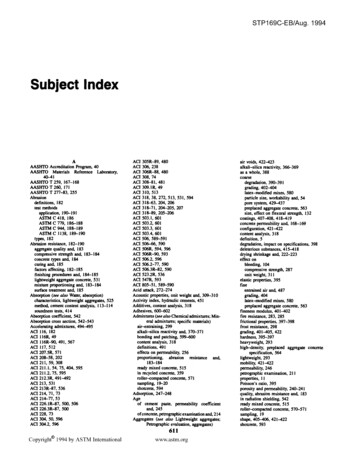
![Index [ astm ]](/img/5/stp37775s-index.jpg)

